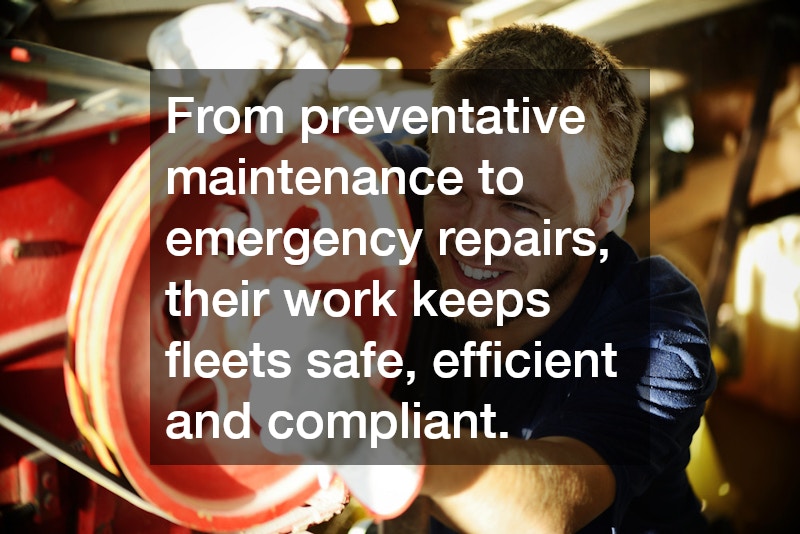When managing a business that relies on commercial vehicles, keeping the fleet in top working condition is essential. Whether it’s a fleet of delivery vans, construction trucks or public transport vehicles, downtime can lead to costly delays and unhappy clients. This is where a fleet mechanic becomes indispensable. But what exactly does a fleet mechanic do and why is their role so vital to operations?
Understanding the Role of a Fleet Mechanic
A fleet mechanic is a specialised automotive technician responsible for the inspection, maintenance and repair of a company’s vehicle fleet. Unlike general mechanics who work on a variety of individual vehicles, fleet mechanics focus on keeping multiple vehicles in consistent working condition.
Their expertise ensures that fleets operate safely, efficiently and in compliance with relevant laws and standards.
Fleet mechanics typically work in-house for large companies, councils or government organisations or they may be employed by fleet maintenance contractors. Their daily responsibilities vary depending on the size of the fleet and the complexity of the vehicles but generally include a mix of preventative maintenance, diagnostics and emergency repairs.
Core Responsibilities
The primary duties of a fleet mechanic involve:
1. Preventative Maintenance
Preventative maintenance is crucial for avoiding breakdowns and extending vehicle lifespan. Fleet mechanics routinely perform oil changes, brake inspections, fluid level checks, tyre rotations and battery testing. They follow service schedules based on manufacturer guidelines and the vehicle’s usage patterns.
2. Diagnostics & Troubleshooting
Modern fleet vehicles often feature advanced onboard systems and computer diagnostics. Fleet mechanics use specialised tools and software to identify problems with engines, transmissions, electronics or emissions systems. Their ability to diagnose issues quickly can prevent minor faults from escalating into major repairs.
3. Repairs & Replacements
From fixing faulty air conditioning to replacing brake pads or alternators, fleet mechanics handle a wide range of repair tasks. For heavy-duty vehicles such as buses or construction trucks, this might also include engine rebuilds, suspension work or welding jobs.
4. Compliance & Recordkeeping
A fleet mechanic ensures all vehicles meet local road safety standards, emissions regulations and workplace health and safety requirements. Keeping detailed records of all services and repairs is part of their job. These records are vital for audits, insurance claims and resale value.
5. Emergency Support
Fleet mechanics are often on call for roadside assistance. When a vehicle breaks down mid-delivery or on a job site, a quick response is necessary to minimise disruption. Some fleet mechanics are mobile, travelling with tools and parts to perform on-site repairs.
Skills & Qualifications
Being a fleet mechanic demands a mix of technical knowledge, problem-solving ability and practical experience. Most fleet mechanics hold a Certificate III in Light Vehicle Mechanical Technology or Heavy Commercial Vehicle Mechanical Technology. Some may further specialise with additional certifications for diesel engines, air brakes or hybrid systems.
Mechanical aptitude and manual dexterity are essential, as the role requires precise handling of parts and tools in often tight or awkward spaces. A solid understanding of hydraulic and electronic systems is necessary, particularly as modern vehicles increasingly rely on computer-controlled components. Familiarity with diagnostic equipment and repair tools is also crucial, enabling fleet mechanics to efficiently identify and address mechanical faults.
Attention to detail and a strong awareness of workplace health and safety protocols are vital. Fleet mechanics are responsible not just for fixing problems but for ensuring every vehicle meets safety and performance standards. Good time management skills and the ability to work independently help them stay productive and meet service schedules. In more specialised roles, experience with specific vehicle types—such as refrigerated trucks, mining equipment or passenger buses—may be required.
Why Businesses Rely on Fleet Mechanics
A well-maintained fleet saves money, boosts efficiency and keeps operations running smoothly. Delays due to mechanical failure not only incur repair costs but may also damage a business’s reputation. Regular maintenance by a dedicated fleet mechanic can reduce unexpected breakdowns, increase fuel efficiency and extend vehicle service life.
Moreover, compliance with vehicle safety regulations is not optional. Businesses that ignore maintenance risk penalties, insurance issues or liability if a mechanical failure causes an accident. A qualified fleet mechanic ensures every vehicle is roadworthy and compliant, giving business owners peace of mind.
The Fleet Mechanic: A Vital Asset to Business Operations
A fleet mechanic is far more than a technician with a toolbox. They are an integral part of any business that relies on vehicles to operate. From preventative maintenance to emergency repairs, their work keeps fleets safe, efficient and compliant. As vehicle technology and industry demands evolve, so too does the skillset of the fleet mechanic, making their role both dynamic and essential.
For businesses wanting to stay ahead in a competitive market, investing in experienced fleet maintenance professionals is not just a good idea—it’s a necessity. Whether you’re managing a small team of utes or a vast array of long-haul trucks, a skilled fleet mechanic is your first line of defence against costly downtime and unexpected issues.
.




